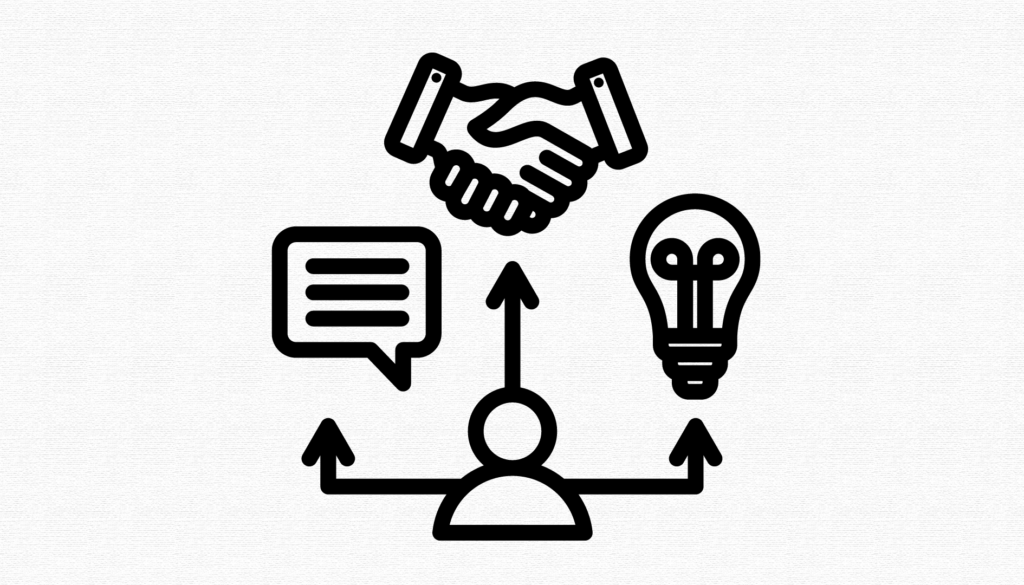Competition in the business world has intensified significantly. Recent research on competitive intelligence indicates that 90% of companies believe their industry is more competitive than in the past three years. Therefore, refining your sales skills can significantly improve your ability to customize your pitches, negotiate effectively with customers, and secure deals ahead of your competitors.
Are you looking to enhance your ability to close deals quickly? The positive news is that it’s entirely possible with dedication and a focus on honing the sales strategies essential for success in your sales career.
This article will outline the essential sales skills you need to develop to close more deals.
In This Article
ToggleWhat Are Sales Skills?

Sales skills are the competencies, insights, and methods to convince potential buyers to purchase a product or service. These skills encompass active listening, empathy, problem-solving, and proficient communication, including social selling. They also require a thorough knowledge of the product or service and an understanding of the customer’s needs.
Also, sales skills involve establishing customer relationships, addressing and resolving objections, negotiating successfully, and finalizing sales. Sales professionals must also possess resilience, maintain a positive outlook, and perform well under pressure to achieve sales goals. Practical sales skills are essential for anyone aiming to excel in a sales position.
Understanding Different Types of Sales Skills to Win More Deals

There are various sales skills, and their importance can vary based on your industry and specific sales role. However, three primary categories of sales skills are commonly recognized: soft skills, communication skills, and hard skills.
a. Soft Sales Skills
Soft sales skills are crucial in the sales industry. They focus on understanding customer needs and identifying solutions to meet those needs. Critical soft skills involve clear communication, attentive listening, establishing rapport with potential clients, and soliciting feedback. They also encompass relationship-building and effective communication.
These skills are vital for salespeople, who spend more time engaging with prospects than finalizing sales. Here are some examples of soft sales skills:
1. Problem-Solving Skills:
The most essential sales skill to develop is becoming an excellent problem solver—someone adept at handling the ever-evolving array of tools, tactics, techniques, and relationships encountered as an inside sales representative. Establishing a consistent process to tackle new problems and manage obstacles in unfamiliar settings is beneficial.
There are four fundamental steps to problem-solving:
- Identify the problem,
- Use brainstorming activities to come up with different solutions,
- Assess and choose the most effective solution,
- Implement the solution.
Training yourself to be a proficient problem solver requires time, practice, and a commitment to actively challenge yourself in demanding situations. Take on new responsibilities, push your limits, and consider engaging in additional projects if the opportunities for advancement are limited in your workplace.
2. Time Management Skills:
Sales involve activities such as initial contact, follow-ups, and closing deals. Effective time management allows you to efficiently identify, focus on, and complete the most critical tasks.
Executing high-value tasks at the optimal time is crucial. Avoid functions that keep you busy without adding productivity. For instance, rather than spending time on unqualified leads, allocate that time to follow up with promising leads or engage in prospecting to maintain a robust sales funnel. Developing time management skills requires more than just determination. Prioritizing tasks and managing your schedule effectively is critical to improving these skills.
Managing your time efficiently may be challenging, but adapting will make it easier. Utilizing tools like a sales CRM can automate routine tasks like data entry and outreach, freeing up your time.
Here are some time management tips for salespeople:
- Prioritize tasks based on their importance and deadlines.
- Minimize distractions to maintain focus on your current task.
- Avoid multitasking, as it can lead to longer task completion times.
- Create and adhere to a schedule to stay organized; consider using a calendar to plan your days.
- Maintain a time log to understand how you spend your time better.
- Set goals with specific deadlines to provide direction and motivation.
- Delegate tasks to those best suited based on their time availability, responsibility level, and expertise.
3. Collaboration Skills:
Collaboration skills are essential for any sales professional. Effectively working with others is crucial for success in any business setting. Collaboration can significantly benefit your business through team interactions, client meetings, or partnerships with suppliers.
Successful collaboration involves sharing ideas and cooperating to leverage collective knowledge. Mastering collaboration can increase sales, reduce cycle times, and improve conversion rates. Committing to team collaboration requires a willingness to tackle less appealing tasks, support teammates when they need help, and take responsibility for projects when necessary.
Tools such as Slack, Asana, ClickUp, Wrike, CRMs that support team transparency, Zoom, and Google Workspace (including Google Docs and Google Sheets) enable collaboration across different geographic locations and help meet sales objectives.
4. Communication Skills:
Communicating effectively with customers and colleagues is crucial in building relationships, understanding customer needs, and closing deals promptly. Excellent communication skills are vital in sales to establish robust customer relationships, engage potential buyers, and negotiate favorable terms for all parties involved.
Strong communication skills enable you to grasp the customer’s desires and needs, allowing you to offer solutions specifically suited to their problems—after all, salespeople are problem solvers. When customers feel listened to and understood, it fosters trust and respect. Effective communication creates a mutual understanding between you and the customer, leading to better engagement and more successful transactions.
Here are five tips to enhance your communication skills in sales:
- Ask insightful questions. This allows you to delve deeper into the customer’s situation, helping you tailor your solutions more effectively.
- Clearly articulate the value of your product or service. Explain the advantages and benefits of your offering to convince potential buyers of its worth.
- Focus on relationship-building before closing deals. Developing trust and rapport can take time, but strong communication skills can speed up this process.
- Invest in communication skills training. Improving these soft skills can significantly enhance your communication ability in any sales context.
5. Customer Service Skills:
While sales focus on closing deals, customer support is essential to the sales process. It could be argued that customer support is as critical as making sales because there would be no customers to sell to without adequate support. A skilled salesperson should swiftly determine their client’s needs and desires before offering a solution.
Outstanding customer service skills involve recognizing and addressing customer needs and issues promptly and effectively. This includes being courteous, helpful, and empathetic, ensuring a positive customer experience at all contact points.
To build loyalty and trust, salespeople must be adept at handling inquiries, solving problems, and surpassing client expectations. Taking notes while a prospect speaks can provide valuable insights to tailor your approach later in the sales process.
6. Consultative Selling Skills:
Consultative selling is a sales strategy that emphasizes building relationships and engaging in open dialogue to meet a customer’s needs. This approach focuses on understanding the customer’s challenges and goals rather than highlighting the product’s features. By recognizing customers’ issues, sellers can offer their products as customized solutions. This method often results in greater customer satisfaction and stronger relationships between buyers and sellers.
The Consultative Selling Framework equips sellers with a consistent and repeatable method for effectively conducting sales discussions.
- Target the Right Prospects: In the initial stage of consultative selling, identify your ideal prospects and create a strategy to engage them.
- Establish Trust: Building a solid relationship is essential in consultative sales. Effective rapport with potential clients can be achieved by aligning with their company values, treating them respectfully, and showing genuine interest in their needs.
- Qualify Your Prospect: Qualifying prospects early saves time in the sales process. Initially, ensure you meet with a decision-maker and verify that their budget is sufficient for your solution.
- Ask Questions: Once you’ve determined that the prospect is serious and suitable, start asking questions to uncover their needs, pain points, and expectations.
- Educate the Clients: The final step involves educating the client about your product and framing it as a solution to their problem. It’s essential to explain why it meets their needs and to provide valuable information that benefits them.
7. Emotional Intelligence:
Emotional intelligence refers to the ability to understand and manage one’s own emotions, perceive the feelings of others, and react with empathy. It includes five key components:
- Self-regulation
- Self-awareness
- Empathy
- Social skills
- Motivation
Individuals with high emotional intelligence, often described as having a high emotional quotient (EQ), are increasingly considered valuable in the workplace. This recognition is due to a growing awareness among managers and business owners of managing workplace stress and fostering a supportive environment for employee mental health.
Emotional intelligence is crucial in the sales industry, where success often depends on navigating interpersonal interactions, handling objections, and forging new relationships.
8. Storytelling Skills in Sales:
Effective salespeople use storytelling to engage even the most straightforward pitch. Stories are memorable and can trigger emotional responses. When combined with a well-structured sales presentation, storytelling can enhance any pitch.
To maintain the interest of potential buyers, share a story that connects with their specific circumstances. For example, if you are a B2B sales representative, discuss how your product or service benefited a similar company in the same industry as your prospective client. Using testimonials and reviews as narrative tools can pique a prospect’s interest.
Draw inspiration from various sources, but keep your stories concise and straightforward. You might lose your audience’s attention if your stories or analogies become too complex or lengthy. Start with an introductory narrative, then enrich it with engaging, relevant details.
9. Sales Negotiation Skills:
A sales negotiation is a conversation to reach an agreement between a buyer and a seller. During these discussions, sellers can respond to buyer concerns by reiterating the value of their product or service and possibly making concessions. These exchanges also allow both parties to conclude discussions positively if they cannot agree. Excelling in negotiation is key for sales representatives, as it is a frequently used skill throughout their careers.
Salespeople who display honesty, empathy, and calmness are likelier to earn buyers’ trust, which is vital for securing ongoing business and referrals. Thus, managing negotiations carefully and ensuring thorough follow-up is critical for a sales team’s success and the company’s reputation. Here are some tips for effective sales negotiations:
- Be Prepared: Knowing your customer’s needs and budget is crucial for successful negotiations through email or past interactions.
- Identify Decision-Makers: Identify the key individuals within the customer’s organization who have the authority to make purchasing decisions.
- Strategize: In some cases, pausing and planning your approach with your team might be helpful.
- Address Underlying Concerns: If customers seem reluctant but cannot pinpoint specific issues, work to uncover and address these hidden concerns.
- Emphasize Value: Customers typically look for the best deal possible during negotiations. Stress the value of your offering to ensure customers feel satisfied with the outcome, even when compromises are necessary.
10. Active Listening:
Active listening is fundamental to many sales tactics, including effective communication, building relationships, and collaborating.
The ability to listen attentively and understand your prospects is crucial in your efforts to secure a sale. Active listening helps you grasp what the prospect is truly seeking and builds trust, which is essential for successful transactions. When prospects feel understood, it encourages a connection that can positively influence sales.
While leading the conversation and extensively promoting your product may be tempting, allowing the prospect ample opportunity to express themselves is a more considerate and effective strategy.
b. Role-Specific Sales Skills
Role-critical skills are the key abilities and competencies that sales professionals need to perform effectively and meet the specific requirements of their roles. These skills are crucial for identifying potential customers, generating leads, articulating the product’s value, and closing sales. They typically involve technical knowledge of the product or service, an understanding of the market and competitors, and the ability to use tools and techniques to improve and facilitate sales.
Every salesperson should aim to develop these essential skills regardless of their position. Here are some of the examples of these skills:
1. Product Knowledge:
A thorough understanding of your product enables you to convey its benefits to potential customers accurately. This knowledge also equips you to address customer questions and overcome objections during sales.
Consider when you have contacted a company’s sales or customer support team. You likely expected them to resolve an issue or assist you with a purchase. You probably wouldn’t be persuaded to buy if they couldn’t communicate the product’s benefits effectively.
An employee who lacks an understanding of how their product addresses specific problems will struggle to advise clients effectively, reducing their ability to make sales. Comprehensive product knowledge transforms your staff into informed experts who know how to sell your product and who to target. Here are some tips:
- Encourage your new employees to tackle specific problems. While training them to address a wide range of issues is possible, this method often leads to passive learning rather than active problem-solving. Instead, assign tasks that require them to solve problems from a customer’s perspective and discuss their approaches.
- Promote independent learning by having new hires explore your entire website, including your resources and knowledge base, to find information. This method takes longer, but the hands-on experience is more memorable.
- Regularly assess your staff’s knowledge to ensure they remain sharp and up-to-date. Conduct tests that challenge them to answer typical customer questions and include some less common inquiries. Consider using formats other than multiple-choice to deepen their understanding.
- Enable them to identify deficiencies in your knowledge base. Have your team review previous chats and call transcripts to find frequently asked questions that are not covered. They can then suggest content for these topics, which your copywriting team can turn into articles.
- Motivate your staff to increase sales by understanding a product’s various applications and intended audience. Implement initiatives like a “Product of the Week” contest to reward the sales representative who sells the most units, fostering a competitive yet educational environment.
2. Sales Pitch Development Skills:
A sales pitch is a brief and persuasive presentation or discussion to persuade someone to purchase a product or service. It is a vital part of the sales process, where salespeople employ various techniques and strategies to engage potential customers and communicate the value and benefits of what they are offering.
Sales pitches are designed to meet the specific needs and preferences of the target audience. They focus on the distinctive features of the product or service, address customer issues, and illustrate how the offering can resolve their problems or satisfy their needs. The primary objective of a sales pitch is to generate interest, establish trust, and ultimately secure a sale.
To succeed, sales pitches should be clear, compelling, and concise. They must immediately grab the audience’s attention and keep them engaged throughout the presentation. Through effective language, storytelling, and engaging visuals, salespeople can present their value proposition and a strong argument for why their product or service is the superior choice.
Sales pitches can take various forms, including in-person meetings, phone calls, emails, online presentations, or social media interactions. The chosen format and delivery method may differ based on the target audience and the product or service sold.
3. Objection Handling:
Objection handling involves a salesperson addressing a prospect’s concerns about a product or service to move the sale forward. It’s a critical component of the sales process, requiring the sales representative to respond in ways that reduce concerns and fill the customer’s understanding gaps. Common objections may include cost, product suitability, or comparisons with competitors.
Whether your team communicates with clients over the phone, in person, through live chat, or on social media, handling objections is essential for initiating contact, making a good impression, and ultimately closing a sale. Critical skills like empathy, confidence, thorough product knowledge, and understanding the psychology of objection handling are vital for turning tentative inquiries into sales, improving customer experience, and boosting sales figures.
Acknowledging the objection, even if you doubt its validity, is essential, as it demonstrates attention to the prospect’s concerns. Active listening is vital—avoid interrupting the prospect to grasp their point of view entirely. Restating and summarizing their objections confirms your understanding. Showing that you take their concerns seriously validates the prospect’s feelings. Additionally, probing questions can uncover deeper motives behind the prospect’s decisions and help address their objections.
4. Closing Sales Skills:
Closing a sale is a critical skill in the sales process. It marks the point where a prospect decides to purchase or sign a contract. It’s essential for meeting sales targets and generating revenue for the business.
Effective closing techniques are vital for securing sales. These strategies and tactics help you persuade customers to choose your product or service over competitors. Developing proficiency in these techniques can significantly differentiate a successful salesperson from an average one.
First, understanding the customer’s needs is crucial. By adopting a consultative approach, you can position your product or service as a solution to their specific challenges, building trust and demonstrating value. For instance, summarizing the benefits and features that address the customer’s needs effectively reinforces buying decisions.
Creating a sense of urgency can also prompt action. Limited-time offers or highlighting the potential cost of inaction can motivate prospects to decide sooner. Additionally, offering a trial period or a “test drive” can help customers experience the value of your product firsthand, increasing their likelihood of committing to the purchase.
Handling objections thoughtfully is another critical aspect. Address common concerns directly and provide clear, compelling responses highlighting your product’s unique advantages. Finally, don’t forget to ask for the sale. Sometimes, a straightforward request can be very effective after you’ve demonstrated value.
5. Sales Demonstrations and Presentations:
Sales demonstrations and presentations place sales representatives under significant pressure to persuade prospects to make purchasing decisions during formal presentations or product demonstrations. These moments are critical for presenting the argument for change. With a limited time to engage your audience, organizing your presentation effectively is essential, incorporating all key elements strategically (utilizing your storytelling abilities) and allowing audience interaction.
To improve your presentation skills, practice regularly, but avoid relying solely on a scripted speech, as this can make it seem like you’re not addressing your potential customers’ unique needs. Use a slide deck to highlight the main points, but ensure your delivery feels natural and tailored to the audience.
Recording your presentations is beneficial for developing sales presentation skills. This allows you to review them later to assess how well the audience was engaged and identify areas for improvement. Additionally, practicing with other sales representatives and welcoming their honest critiques can provide valuable insights, helping you learn from the collective experiences of others in the field.
6. Social Selling:
Social selling generates leads by actively participating on social media platforms where potential customers are present.
Social selling aims to establish trust. This way, your business comes to mind when potential customers need your products or services. This is achieved not by aggressively promoting products but by building relationships, engaging socially, and contributing usefully to online communities.
Social media is an excellent tool for better understanding your target audience. To enhance your sales approach, you can collect current information on potential clients through Twitter conversations, LinkedIn threads, and Facebook group discussions.
To enhance your social selling skills, it’s important to regularly engage on social media to become familiar with various platforms. This familiarity will help you efficiently use different features across platforms. Additionally, setting goals for social engagement can be beneficial. As you interact more on social media, you’ll naturally gain followers. By establishing a goal to increase your followers over the next few months, you’ll find that regular interaction becomes more habitual.
c. Hard Sales Skills
Hard sales skills are often referred to as technical sales skills. These skills focus on your capacity to fulfill the commitments of your product or service. Key hard skills encompass various data-driven customer retention techniques with much background work.
For any salesperson, especially B2C (business-to-consumer) salespersons, hard sales skills are critical, as their role often involves more deal-closing activities than relationship-building. Here are some of the examples of hard sales skills:
1. Prospecting:
Sales prospecting involves identifying and reaching out to potential customers to increase revenue. Sales representatives conduct prospecting by locating and interacting with potential leads to convert them into opportunities and, eventually, customers.
This process typically occurs through individual outbound activities. For instance, sales development representatives (SDRs) might engage prospects by sending emails, making cold calls, or using LinkedIn InMails to target individuals who match their ideal customer profile (ICP). The primary goals of prospecting are to initiate conversations, determine whether a prospect qualifies as a potential customer, and present the product as a solution to their issues.
[The process includes qualifying prospects by assessing their fit with your ideal customer profile, interest in your product, and purchasing authority. This assessment helps you focus your efforts on prospects most likely to convert. Engaging with prospects through multiple channels like email, phone calls, and social media is crucial. It’s also beneficial to leverage customer referrals and to be seen as a resource beyond the sale.
Automation tools can streamline the identification and engagement with potential buyers. Platforms like Crunchbase can automatically suggest prospects based on predefined criteria, saving time and ensuring focus on high-quality leads
2. Persuasive Skills:
Strong persuasive selling skills are essential to standing out in this industry. Customers often face constant advertisements and pitches, so it’s crucial to effectively communicate why your product or service is a smart investment. Effective persuasion involves transforming challenges into opportunities and maintaining authenticity in your sales approach.
Here are several strategies to enhance your persuasive abilities:
- Pay close attention and tailor your responses to the conversation.
- Show genuine interest in the viewpoints of others.
- Use body language to support your spoken words.
- Communicate your ideas clearly and concisely.
- Remain courteous and respectful towards different opinions.
- Avoid becoming argumentative or confrontational.
- Strive to make the other person feel at ease.
3. Follow Up:
Mastering the follow-up is crucial for effectiveness in sales. Securing a definitive response from every prospect is essential to avoid uncertainty. While follow-up strategies are nuanced, improving your skills comes with practice. So, how frequently should you follow up?
If your initial contact is cold and you haven’t previously interacted with the recipient, limit your follow-ups to six attempts. However, if you’ve engaged with the prospect before and haven’t received a definite rejection, you should follow up until you receive a clear response.
Fortunately, tools such as follow-up reminders and email workflows in your CRM can help manage the timing of these follow-ups, allowing you to focus more on the content and quality of your communications.
4. Adapting to Technology:
Sales professionals today utilize a wide range of technologies, extending far beyond customer relationship management (CRM) systems. The technology used in sales can be grouped into several categories:
- Data networks
- Sales enablement or engagement tools
- Buyer enablement tools
- Performance management systems
- CRM software
- Communication tools
- and others
It’s not practical to expect every salesperson to master every tool available, but having a basic understanding of technology and learning new tools quickly are essential skills. Those who have grown up during the digital age may find this easier.
Approach new technologies with curiosity and a willingness to experiment. This attitude helps you grasp the broader capabilities of new tools. It’s unrealistic to assume that complex, feature-rich technologies will be immediately intuitive. Committing time to learn and leverage each technology tool effectively is crucial for maximizing its benefits.
5. Perform Cold Outreach Effectively:
Performing cold outreach effectively is crucial for any sales representative looking to succeed. Successful sales techniques require precise timing and the right combination of strategies. Among these, cold calls can be particularly challenging, as they involve contacting leads who are unfamiliar with you. Despite the difficulty, studies confirm the effectiveness of cold calls. Rather than delaying, taking action and starting making calls is essential. In contrast, warm calls involve contacting prospects who have previously interacted with your company. These leads are considered “warm” because they have shown some interest, giving you more confidence when you reach out, though a solid sales script is still necessary.
Additionally, email outreach is a staple in maintaining communication. Unlike sending mass emails to thousands and hoping for a response, developing emails that resonate with and grab your audience’s attention is an acquired skill. Continuously testing and refining your messaging is critical to increasing conversion rates.
Conclusion
Developing practical sales skills is essential for success in a highly competitive business landscape. Understanding and honing soft and hard sales skills can dramatically increase your ability to close deals. Key competencies include problem-solving, time management, collaboration, and effective communication.
Role-specific skills like product knowledge, objection handling, and persuasive techniques are also crucial. By mastering these skills, sales professionals can better understand customer needs, build stronger relationships, and effectively address concerns. Dedication to improving these skills can lead to higher conversion rates and more tremendous success in your sales career. Focus on these strategies to stay ahead in the ever-evolving world of sales.
Frequently Asked Questions
What Is the Role of a Sales Development Representative (SDR) in Boosting Sales?
An SDR focuses on generating and qualifying new leads by reaching potential customers. By effectively qualifying leads, SDRs ensure the sales pipeline is filled with prospects more likely to convert, thus boosting overall sales efficiency and effectiveness.
How Do SDRs Qualify Leads to Improve the Sales Process?
SDRs engage with potential customers through calls or emails to assess interest and fit for the product or service. Active listening helps understand prospects’ needs, ensuring only those with genuine potential move forward in the sales pipeline, thus improving sales team efficiency.
What Skills Are Essential for an SDR to Be Effective?
Essential skills include communication, active listening, resilience, and organizational abilities. SDRs communicate persuasively, actively listen to prospects’ needs, bounce back from setbacks, and stay organized to manage leads efficiently, fostering strong relationships and maintaining an efficient pipeline.
How Does Collaboration Between SDRs and Other Sales Team Members Enhance Sales Performance?
Collaboration ensures a seamless transition of qualified leads through the sales pipeline. SDRs provide valuable information about prospects to account executives, who tailor their strategies accordingly. This approach leads to higher conversion rates and improved sales outcomes through a unified team strategy.










